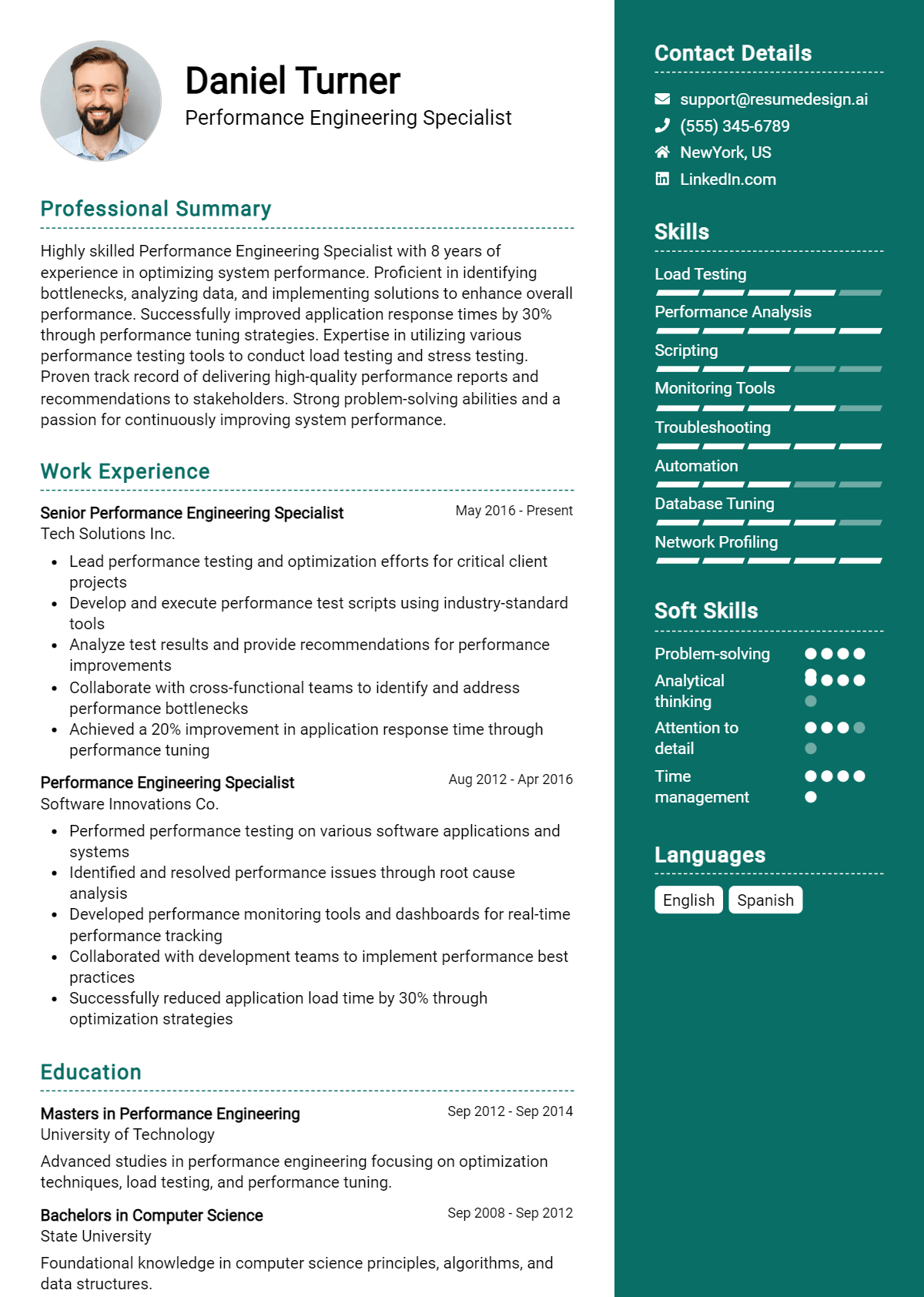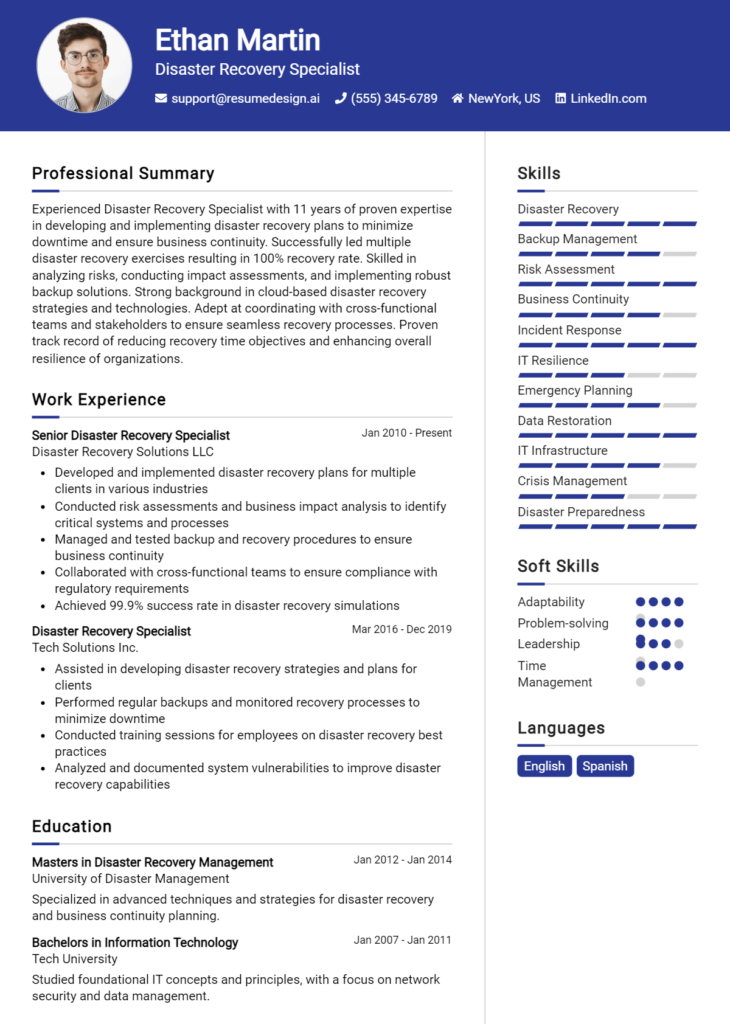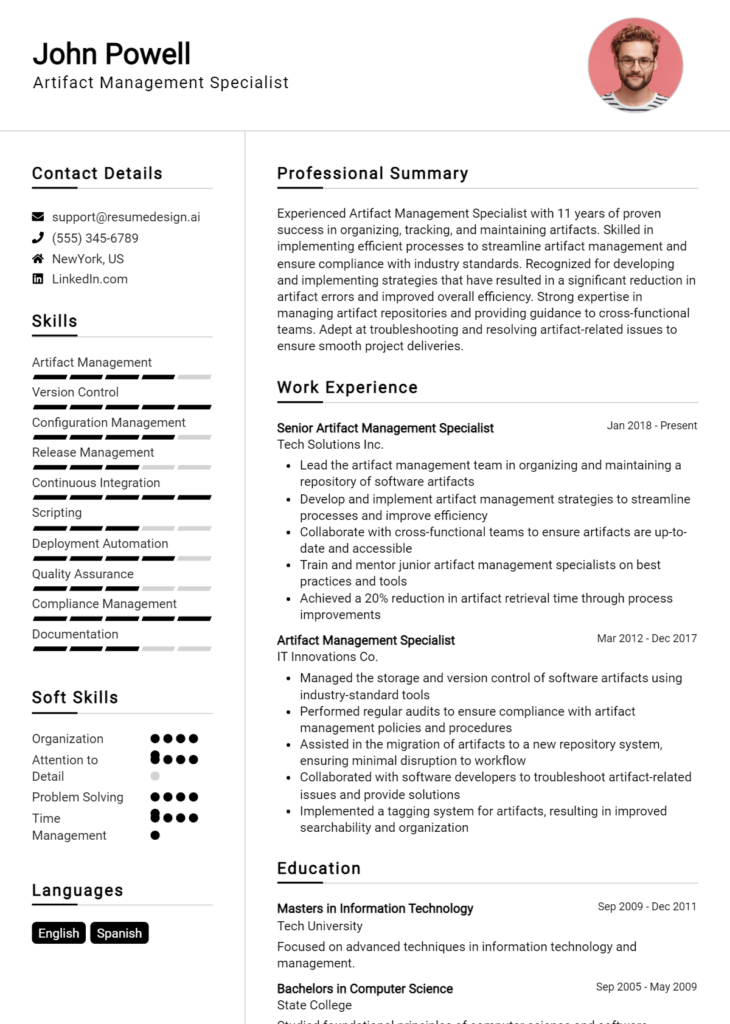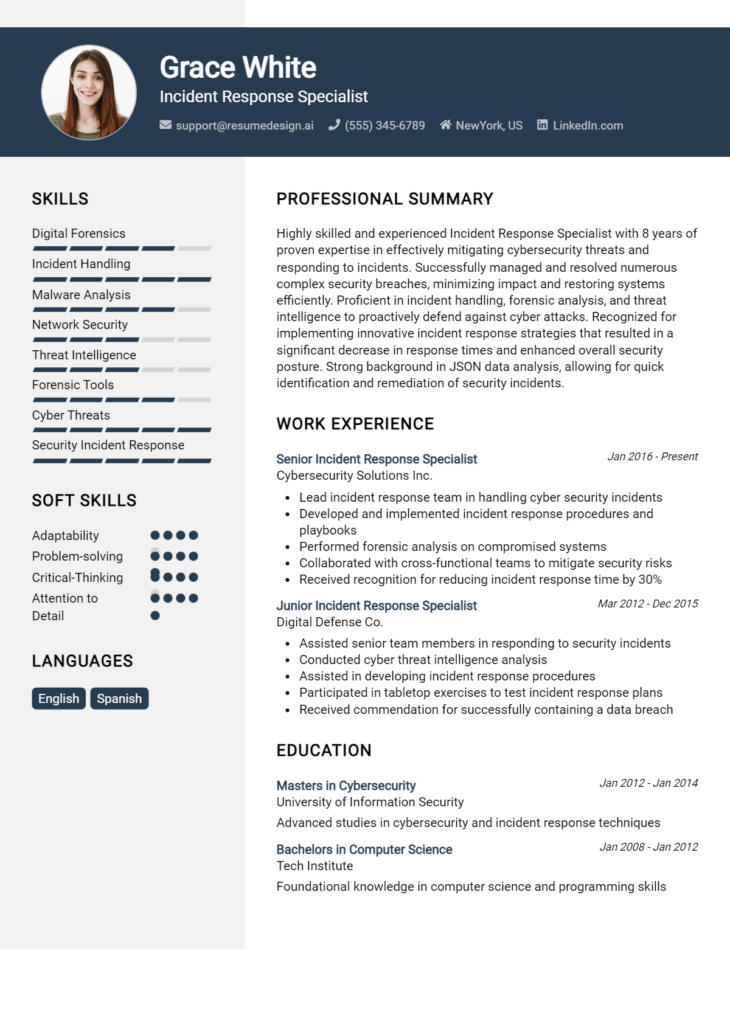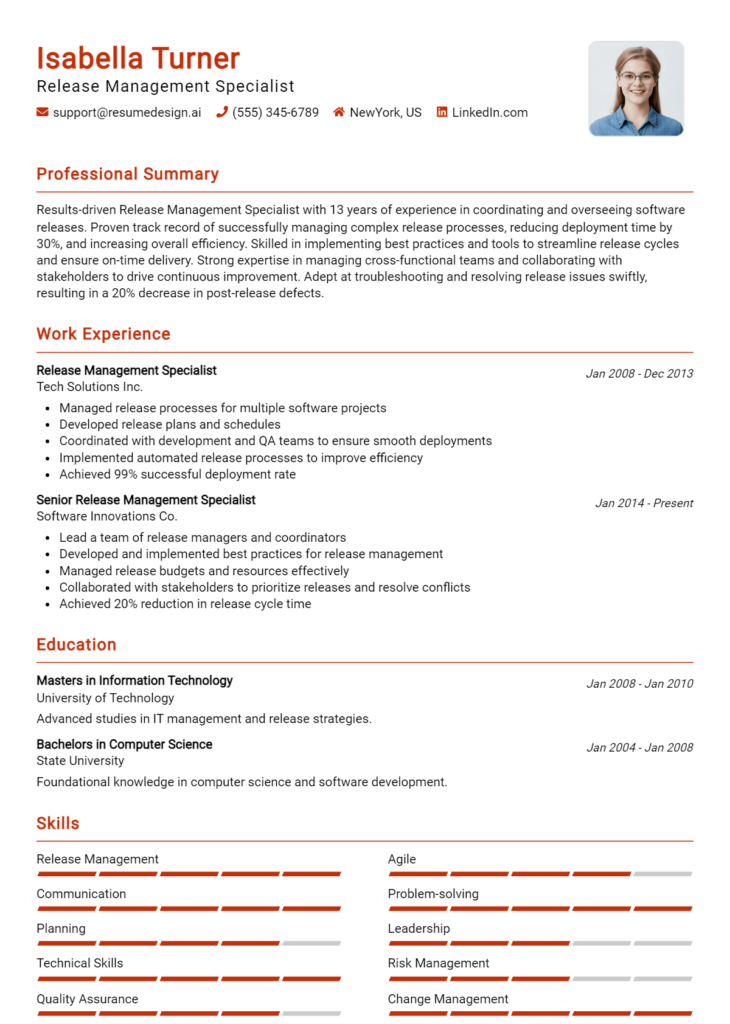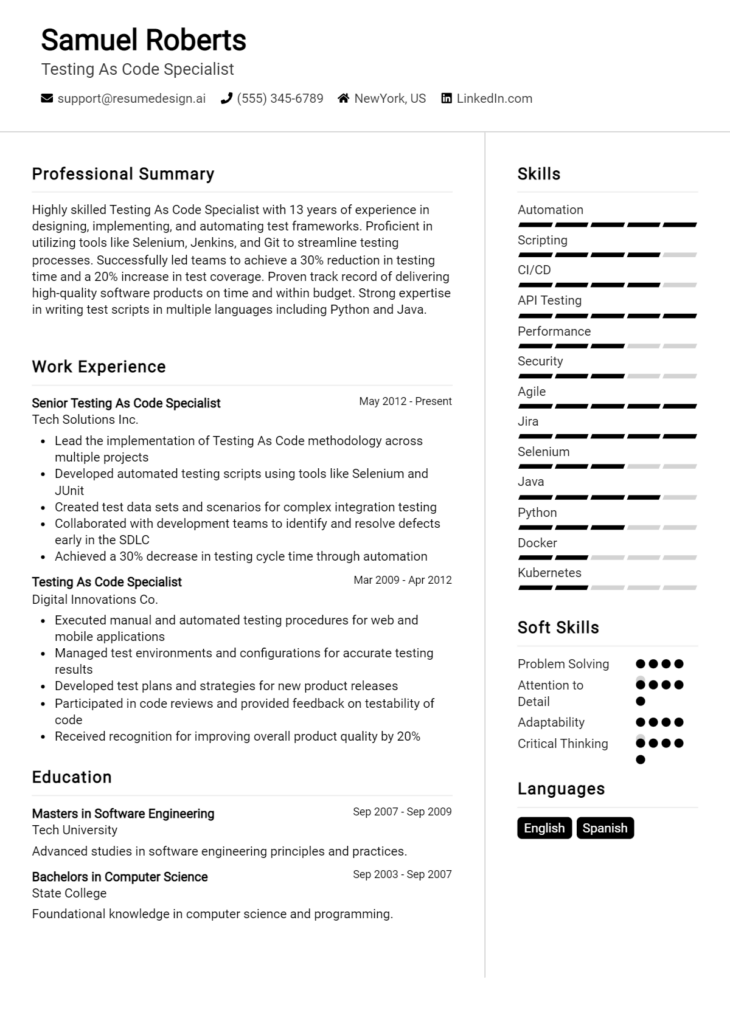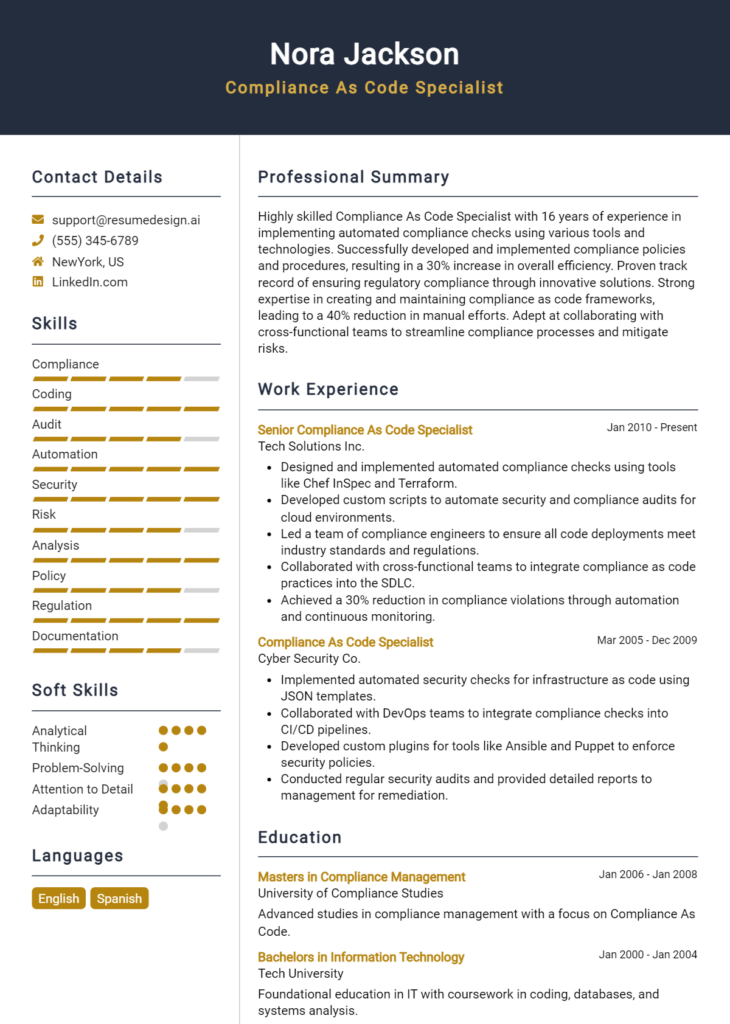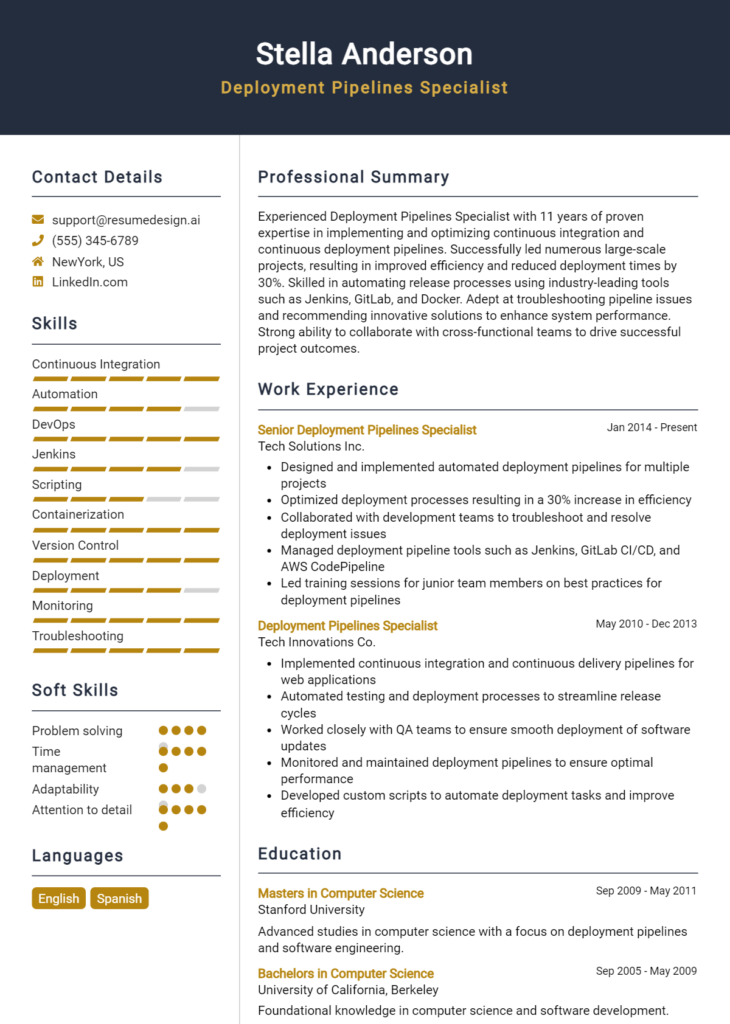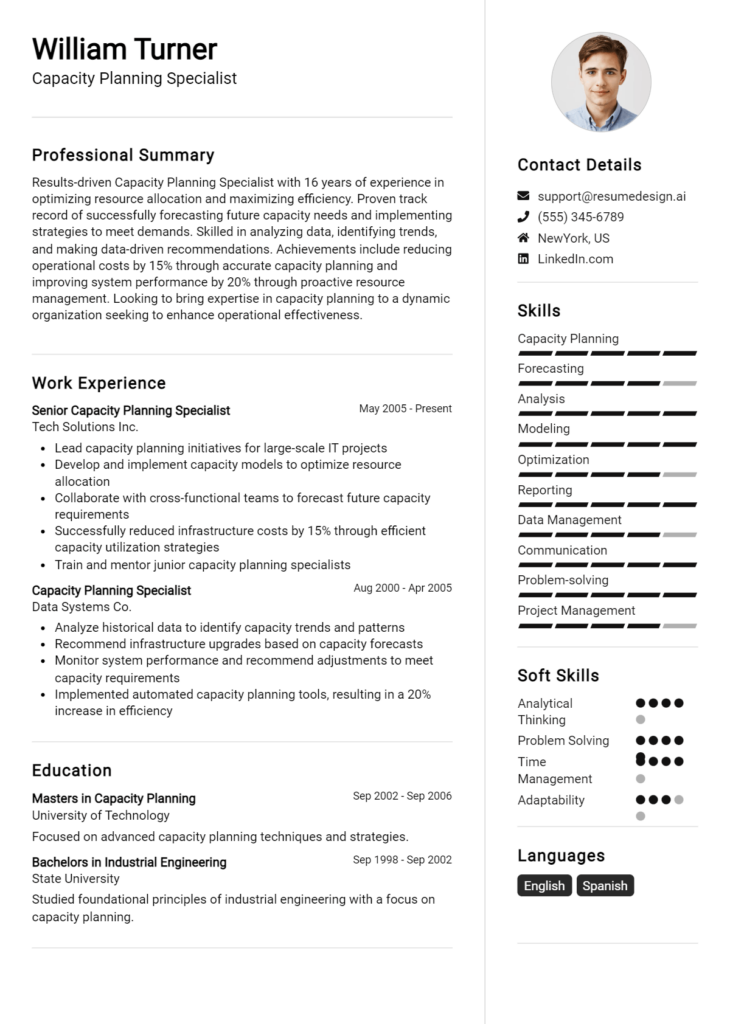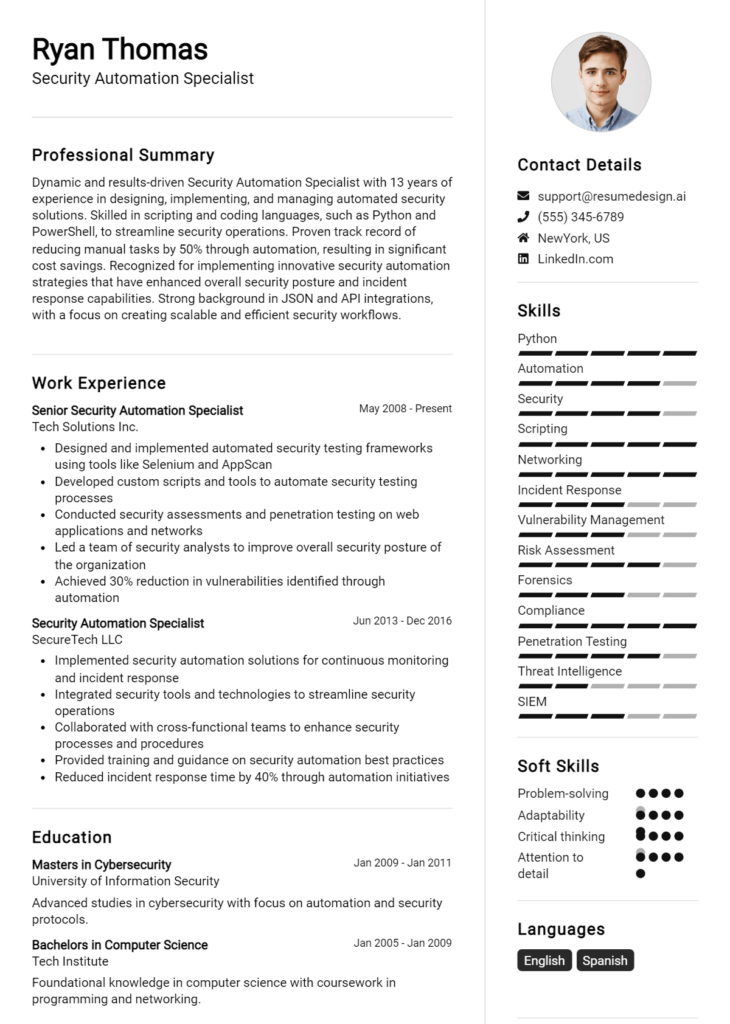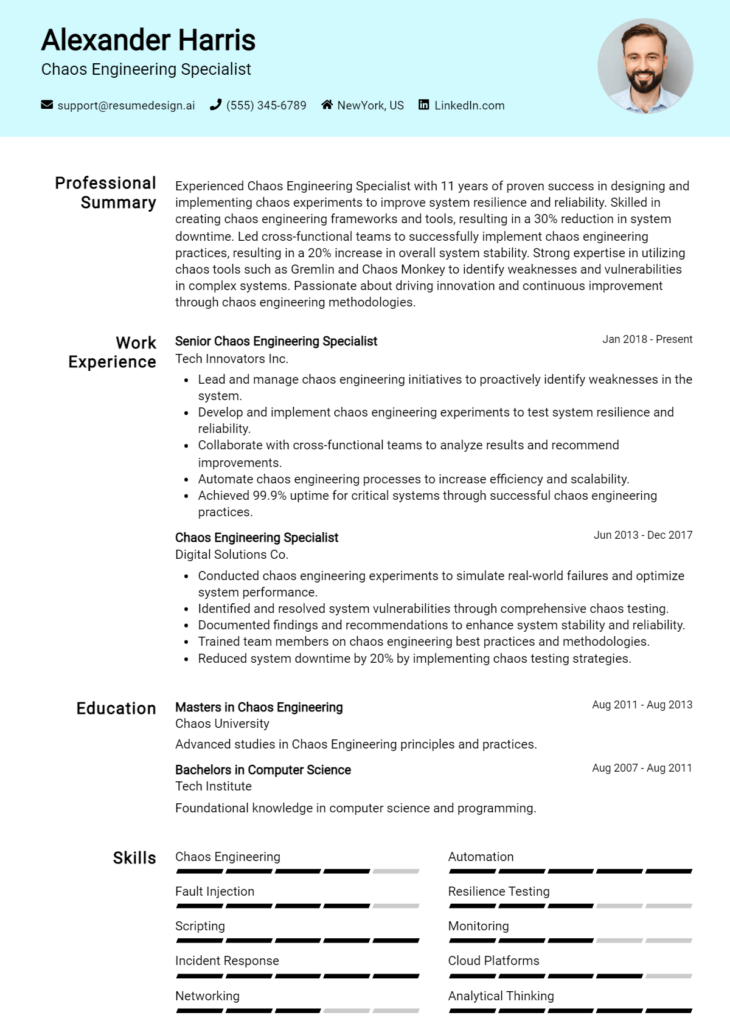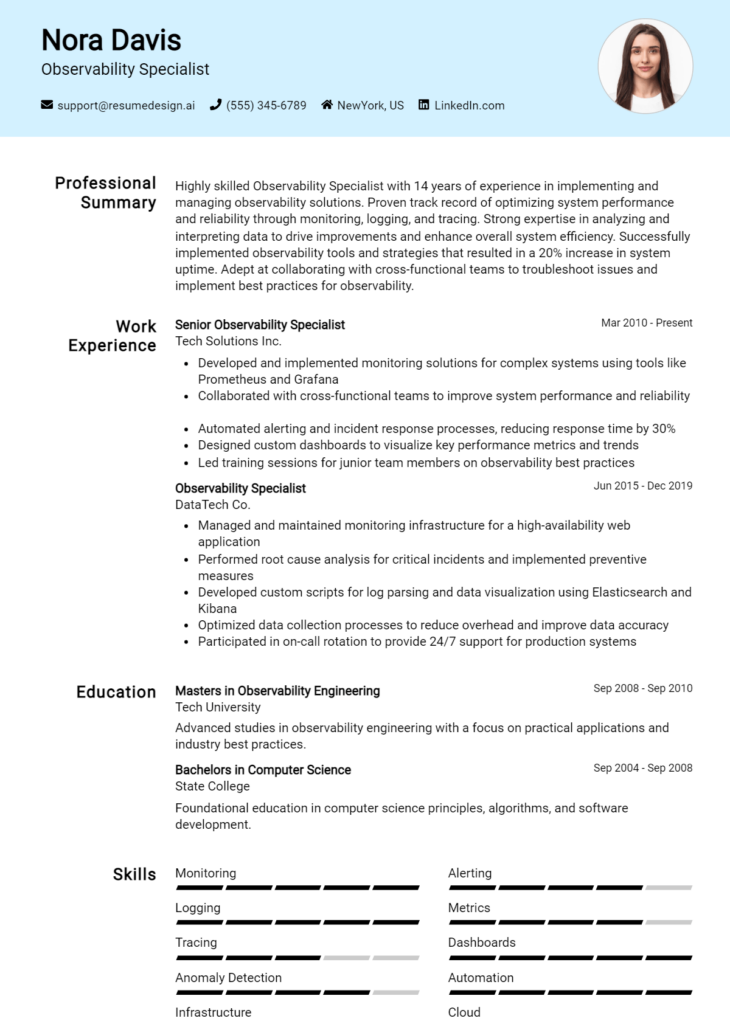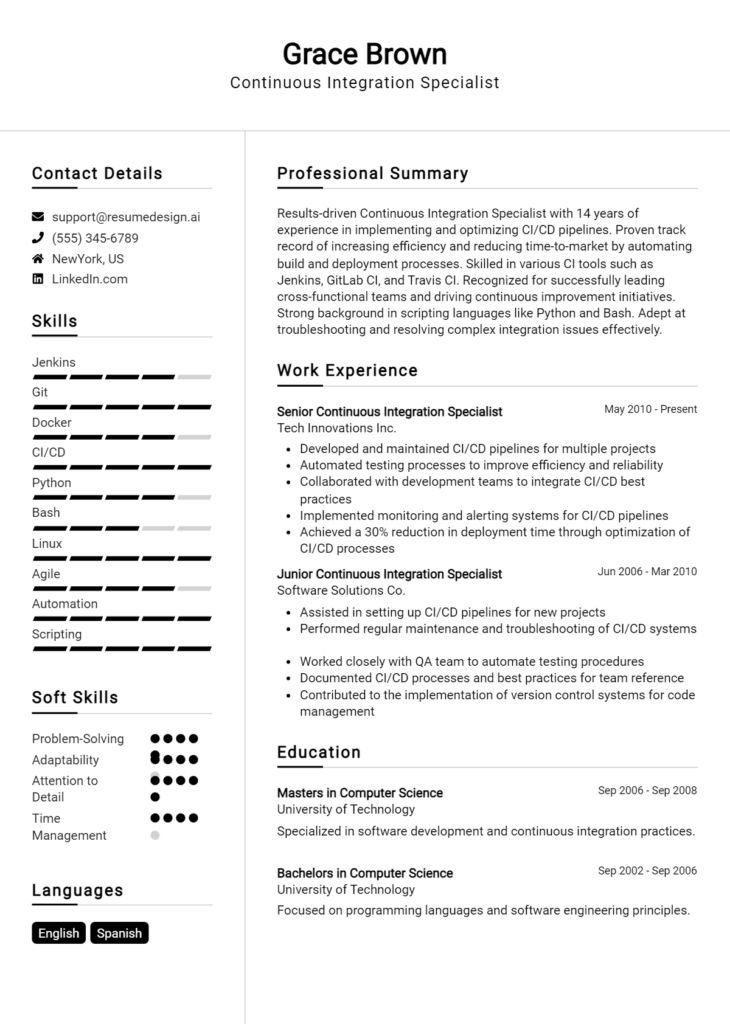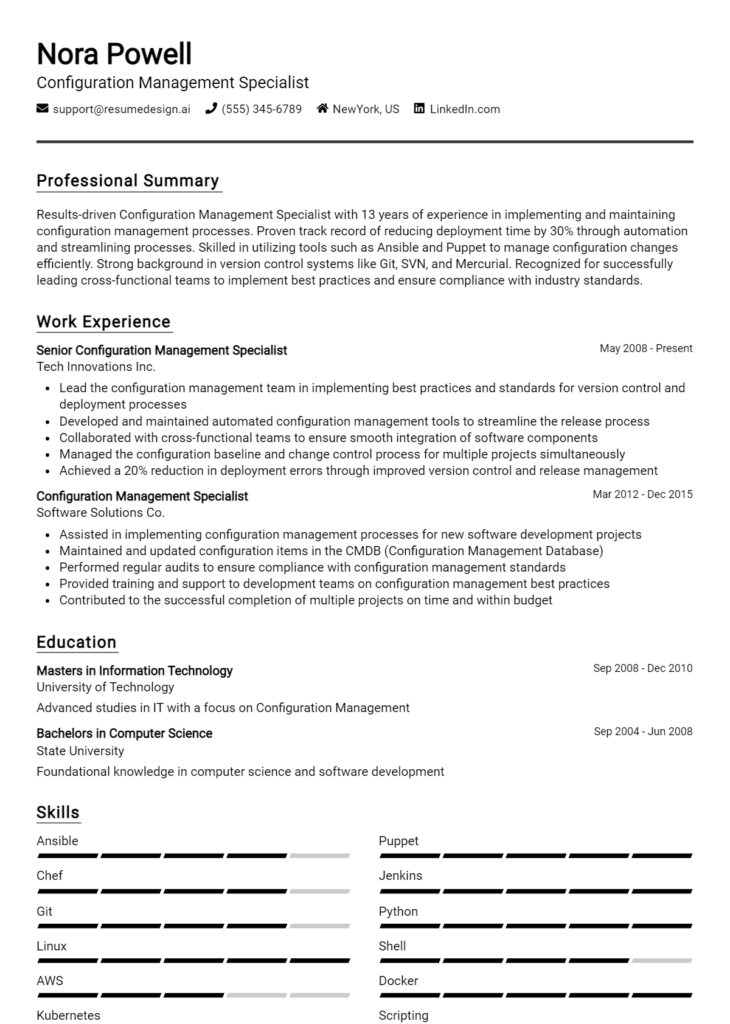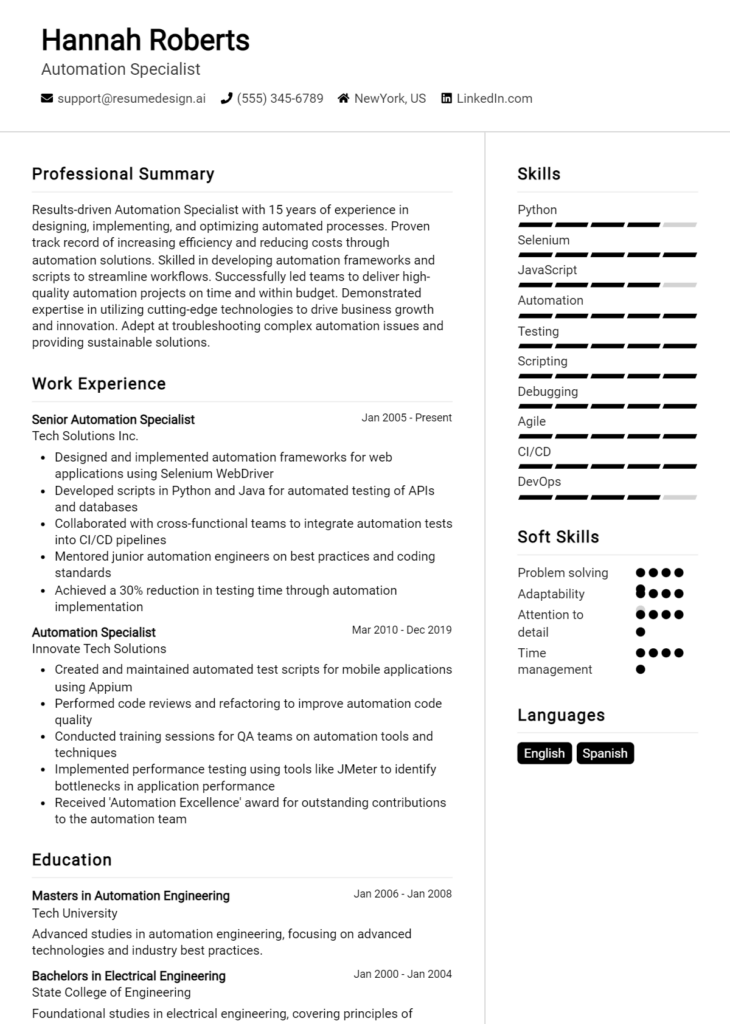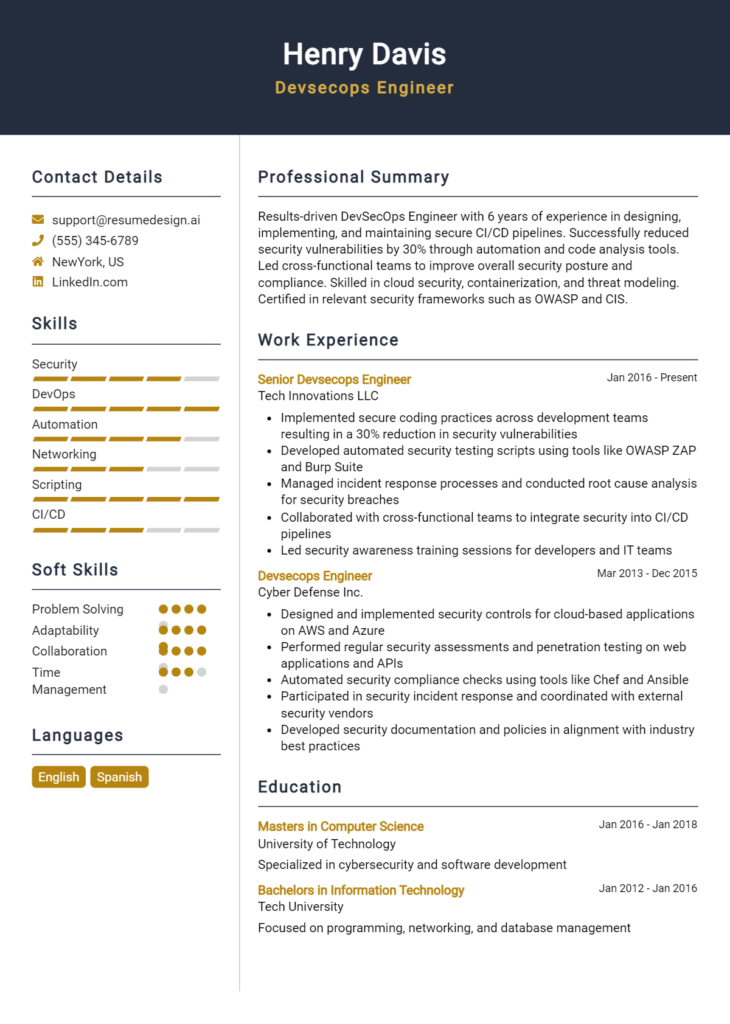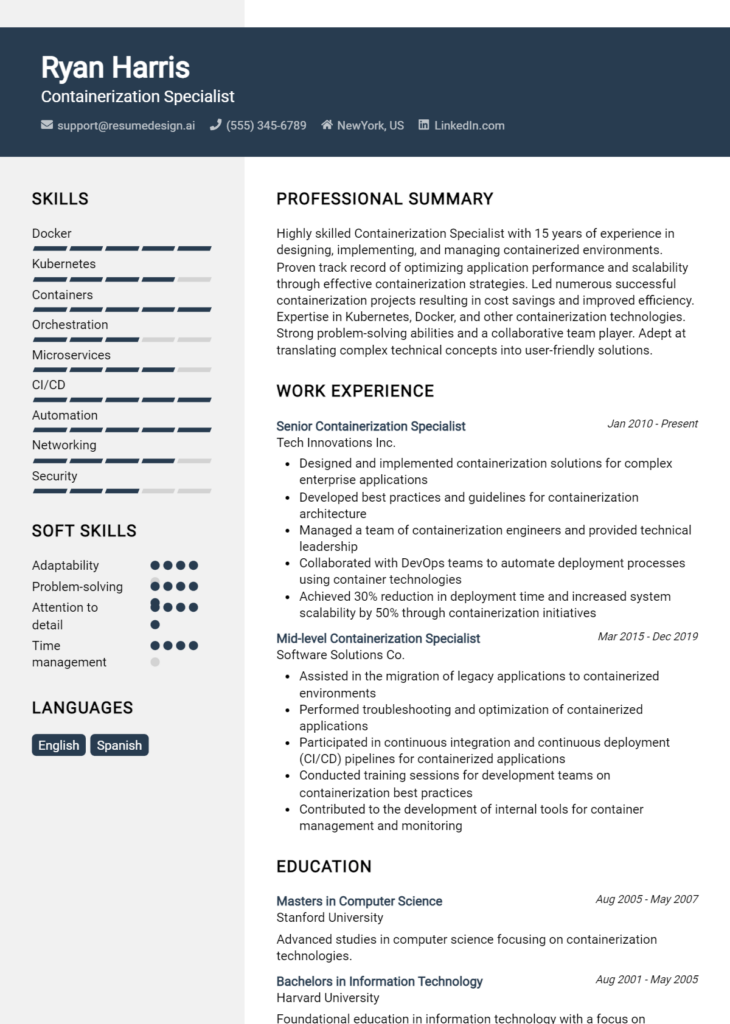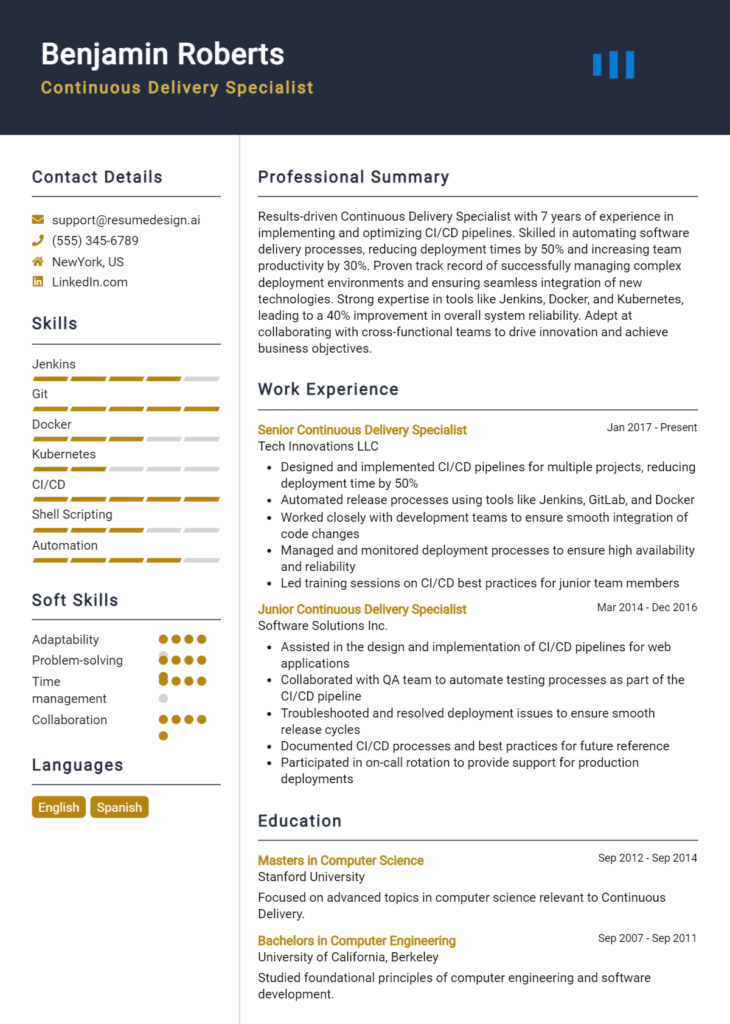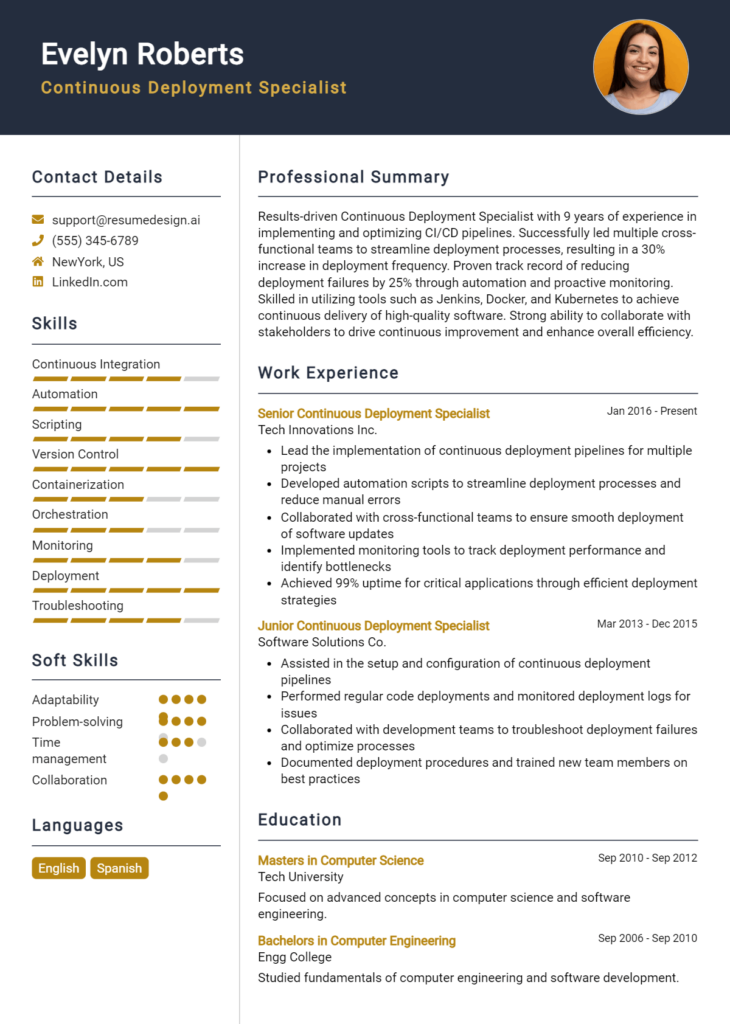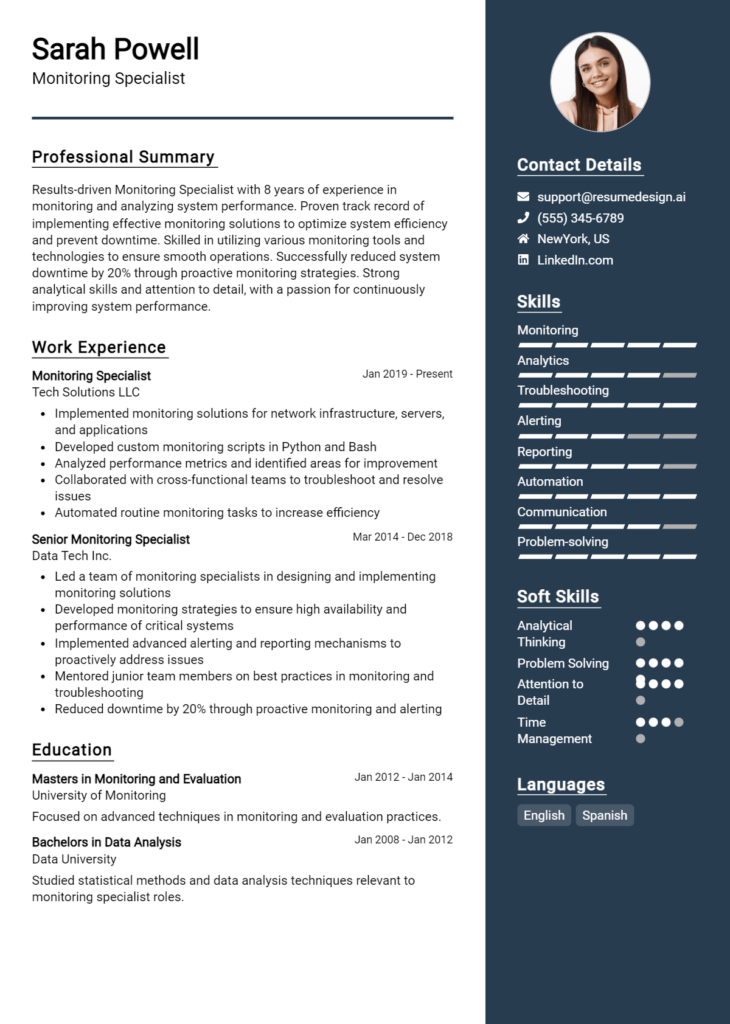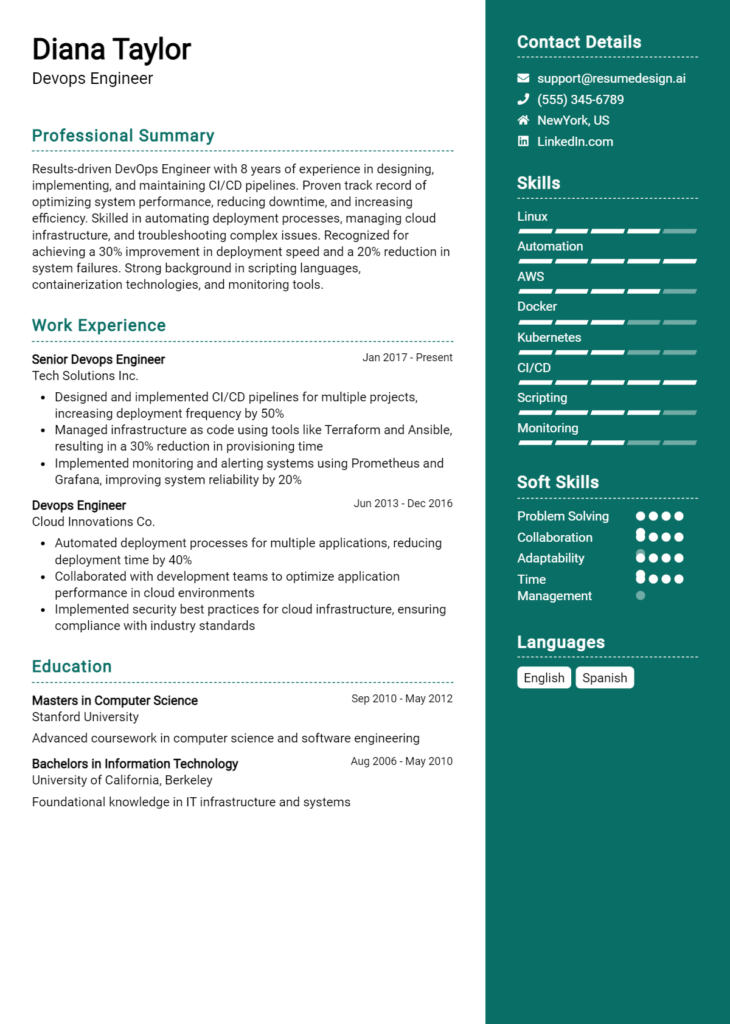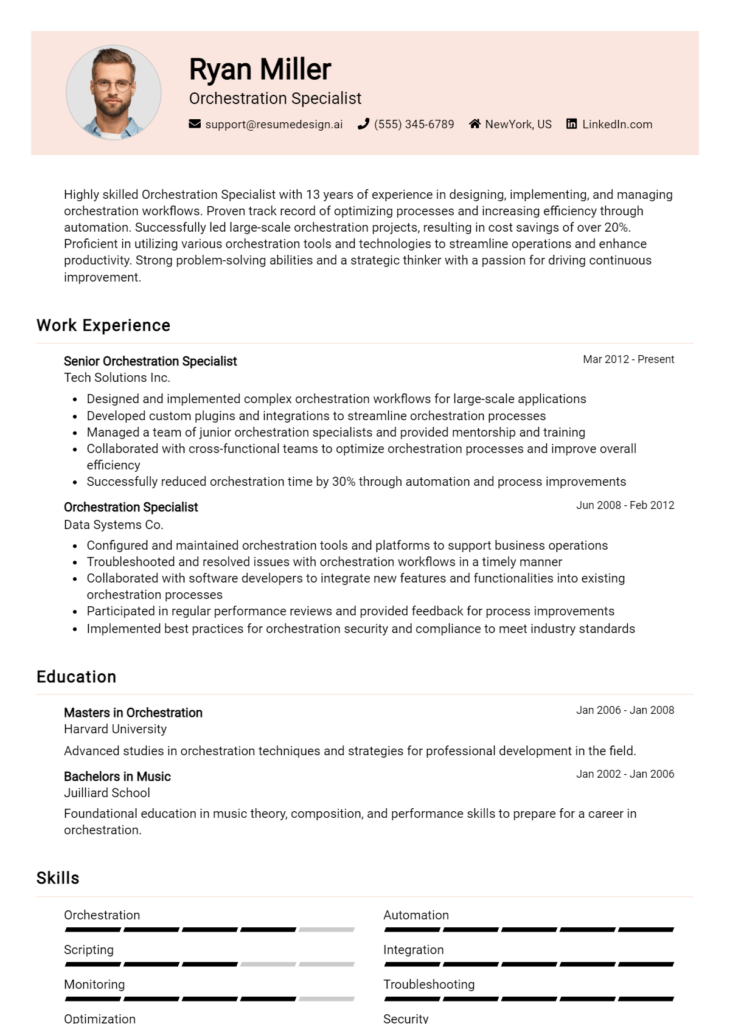Performance Engineering Specialist Core Responsibilities
A Performance Engineering Specialist plays a crucial role in optimizing application performance across various departments, ensuring seamless integration between development, operations, and quality assurance teams. Key responsibilities include analyzing system performance, identifying bottlenecks, and implementing solutions to enhance efficiency. Essential skills encompass technical prowess in performance testing tools, operational insights, and strong problem-solving abilities. These competencies are vital in driving organizational goals, and a well-structured resume can effectively highlight these qualifications to prospective employers.
Common Responsibilities Listed on Performance Engineering Specialist Resume
- Conduct performance testing and analysis of applications.
- Identify and troubleshoot performance bottlenecks.
- Collaborate with development teams to refine application code.
- Design and implement performance monitoring solutions.
- Develop performance test plans and strategies.
- Provide recommendations for system optimizations.
- Analyze user experience and application responsiveness.
- Document performance testing results and findings.
- Train staff on performance testing tools and methodologies.
- Maintain performance test environments and configurations.
- Stay updated on industry trends and best practices.
High-Level Resume Tips for Performance Engineering Specialist Professionals
In the competitive landscape of technology and engineering, a well-crafted resume is crucial for Performance Engineering Specialist professionals looking to make their mark. Your resume is often the first impression you make on potential employers, serving as a powerful marketing tool that showcases not only your skills but also your achievements and contributions to past projects. A compelling resume can differentiate you from other candidates, emphasizing your technical expertise, problem-solving abilities, and analytical skills. This guide will provide practical and actionable resume tips specifically tailored for Performance Engineering Specialist professionals, helping you to effectively communicate your value to potential employers.
Top Resume Tips for Performance Engineering Specialist Professionals
- Tailor your resume to the job description by using relevant keywords and phrases that match the requirements of the position.
- Highlight your relevant experience in performance testing, tuning, and optimization, making sure to focus on specific technologies and tools you have used.
- Quantify your achievements by including specific metrics, such as percentage improvements in performance, reduced load times, or increased system throughput.
- Showcase your proficiency in industry-standard performance engineering tools (e.g., LoadRunner, JMeter, Gatling) to demonstrate hands-on expertise.
- Include any relevant certifications (e.g., ISTQB, AWS Certified Solutions Architect) that can enhance your credibility in the field.
- Detail your experience with performance monitoring and analysis, including the methodologies and frameworks you have utilized.
- Emphasize your problem-solving skills by providing examples of how you have identified performance bottlenecks and implemented effective solutions.
- Keep your resume concise and focused, ideally one page, to ensure that hiring managers can quickly assess your qualifications.
- Utilize a clean and professional format that enhances readability and clearly delineates sections such as experience, skills, and education.
- Consider adding a summary statement that succinctly encapsulates your career goals and key qualifications as a Performance Engineering Specialist.
Implementing these tips can significantly increase your chances of landing a job in the Performance Engineering Specialist field. By presenting a polished and targeted resume, you not only highlight your qualifications but also demonstrate your understanding of the industry's demands and your readiness to contribute effectively to your next employer's success.
Why Resume Headlines & Titles are Important for Performance Engineering Specialist
In the competitive landscape of performance engineering, a well-crafted resume headline or title is crucial for standing out among a sea of applicants. As a Performance Engineering Specialist, your resume headline serves as the first impression for hiring managers, encapsulating your key qualifications in a succinct and impactful manner. A strong headline not only grabs attention but also provides a quick summary of what makes you a suitable candidate for the role. It should be concise, relevant, and directly aligned with the job you are applying for, ensuring that it resonates with the needs of the employer.
Best Practices for Crafting Resume Headlines for Performance Engineering Specialist
- Keep it concise—aim for a headline that is no longer than one sentence.
- Use relevant keywords from the job description to ensure alignment with the role.
- Highlight specific skills or certifications that set you apart.
- Incorporate measurable achievements or results to demonstrate your impact.
- Avoid jargon or overly technical language that may confuse hiring managers.
- Make it compelling by using action verbs or strong adjectives.
- Ensure it reflects your unique selling proposition as a candidate.
- Tailor your headline for each application to match the specific job requirements.
Example Resume Headlines for Performance Engineering Specialist
Strong Resume Headlines
Performance Engineering Specialist with 8+ Years of Expertise in Load Testing and Optimization
Results-Driven Performance Engineer Specializing in Application Performance Monitoring and Analysis
Certified Performance Engineering Expert Focused on Enhancing System Efficiency and Scalability
Weak Resume Headlines
Engineer Looking for Job
Performance Specialist
Strong resume headlines are effective because they immediately communicate the candidate's qualifications and relevance to the job, making them memorable and engaging for hiring managers. They utilize specific language that highlights key skills and achievements, which helps to differentiate the candidate from others. In contrast, weak headlines fail to impress because they are vague and lacking in detail, providing little insight into the candidate's capabilities or what they bring to the table. This lack of specificity can make it easy for hiring managers to overlook these candidates in favor of those with more impactful and targeted headlines.
Writing an Exceptional Performance Engineering Specialist Resume Summary
Crafting a standout resume summary is crucial for a Performance Engineering Specialist as it serves as the first impression for hiring managers. A well-written summary quickly captures attention, highlighting key skills, relevant experience, and notable accomplishments that align with the job role. In a competitive job market, this concise and impactful section can significantly influence whether a candidate is invited for an interview. Therefore, it is essential to tailor the summary to reflect the specific requirements of the position being applied for, ensuring it resonates with potential employers.
Best Practices for Writing a Performance Engineering Specialist Resume Summary
- Quantify achievements to demonstrate impact (e.g., "Improved application performance by 30% through targeted optimizations").
- Focus on relevant skills that match the job description (e.g., "Expert in load testing and performance tuning").
- Tailor the summary for the specific job by incorporating keywords from the job listing.
- Keep it concise, ideally within 2-4 sentences, to maintain the reader’s attention.
- Highlight specific technologies and tools relevant to performance engineering (e.g., "Proficient in JMeter and LoadRunner").
- Showcase your understanding of business objectives and how your work contributes to them.
- Avoid jargon and overly technical language that may not resonate with HR personnel.
- Use action verbs to convey a sense of proactivity and results-oriented mindset (e.g., "Led", "Developed", "Optimized").
Example Performance Engineering Specialist Resume Summaries
Strong Resume Summaries
Performance Engineering Specialist with over 5 years of experience optimizing high-traffic applications. Successfully reduced page load times by 40%, enhancing user experience and boosting conversion rates by 25%.
Detail-oriented Performance Engineer with expertise in load testing and bottleneck identification using JMeter and LoadRunner. Achieved a 50% improvement in system throughput for a major e-commerce platform, resulting in annual savings of $100,000.
Results-driven Performance Engineering Specialist skilled in system performance analysis and tuning. Played a crucial role in a project that increased application scalability by 60%, supporting a growing user base and improving overall stability.
Weak Resume Summaries
Performance Engineer with experience in various projects, looking for a challenging position.
Dedicated professional with skills in performance improvement and testing. Interested in contributing to a team.
The strong resume summaries are effective because they provide specific achievements, quantify results, and clearly articulate relevant skills that align with the role of a Performance Engineering Specialist. They directly address the impact of the candidate's work, making them memorable to hiring managers. Conversely, the weak summaries lack detail, specificity, and measurable outcomes, making them too generic and less compelling in a competitive job market.
Work Experience Section for Performance Engineering Specialist Resume
The work experience section is a critical component of a Performance Engineering Specialist resume, as it serves as a direct reflection of the candidate's technical skills and their ability to manage teams effectively. This section highlights how the candidate has successfully delivered high-quality products through performance testing, optimization, and analysis. Furthermore, quantifying achievements and aligning these experiences with industry standards is essential for showcasing one's impact in previous roles, ultimately setting the candidate apart in a competitive job market.
Best Practices for Performance Engineering Specialist Work Experience
- Focus on quantifiable achievements, using metrics to demonstrate the impact of your work.
- Include specific tools and technologies you've used to highlight your technical expertise.
- Emphasize leadership roles and teamwork experiences to showcase your ability to manage and collaborate with others.
- Align your experiences with industry standards and best practices to demonstrate relevancy.
- Use action verbs to describe your contributions and responsibilities in each role.
- Tailor your experiences to the job description to better match potential employer expectations.
- Highlight continuous improvement initiatives and their results to showcase your commitment to quality.
- Provide context for your achievements to give potential employers a clearer understanding of your contributions.
Example Work Experiences for Performance Engineering Specialist
Strong Experiences
- Led a team of 5 engineers in a performance testing initiative that reduced application load time by 40%, improving end-user satisfaction ratings by 25%.
- Implemented automated performance testing tools that decreased testing cycles by 30%, allowing for faster release schedules.
- Collaborated with cross-functional teams to optimize system architecture, resulting in a 50% increase in scalability and a 20% reduction in operational costs.
- Designed and executed performance benchmarks for key applications, resulting in a detailed report that informed critical architectural decisions and improved system reliability by 35%.
Weak Experiences
- Worked on performance testing projects.
- Helped to improve software performance.
- Participated in team meetings about performance issues.
- Assisted in gathering performance metrics.
The examples of strong experiences are considered effective as they include quantifiable outcomes and specific contributions that clearly demonstrate the candidate's impact on their organization. In contrast, the weak experiences lack detail, metrics, and context, making them vague and unimpressive. Strong experiences showcase not only technical expertise but also leadership and collaboration, while weak experiences fail to convey the candidate's true capabilities and achievements.
Education and Certifications Section for Performance Engineering Specialist Resume
The education and certifications section of a Performance Engineering Specialist resume plays a crucial role in showcasing the candidate's academic credentials, industry-specific qualifications, and dedication to continuous learning. This section provides potential employers with a clear indication of the candidate's foundational knowledge and expertise, which is essential for performance engineering roles that require analytical thinking and technical proficiency. Including relevant coursework, specialized training, and recognized certifications not only enhances the candidate's credibility but also demonstrates alignment with the skills and qualifications sought by employers in the field.
Best Practices for Performance Engineering Specialist Education and Certifications
- Prioritize relevant degrees in fields such as Computer Science, Information Technology, or Software Engineering.
- Include industry-recognized certifications such as Certified Performance Engineering Professional (CPEP) or ITIL.
- List specific coursework related to performance testing, load balancing, or systems optimization.
- Highlight any specialized training in tools commonly used in performance engineering, such as LoadRunner or JMeter.
- Update your certifications regularly to reflect the latest technologies and methodologies in performance engineering.
- Consider including online courses or workshops that demonstrate proactive learning in performance engineering disciplines.
- Present your educational background in reverse chronological order, starting with the most recent qualifications.
- Use clear formatting to distinguish between degrees and certifications for easy readability.
Example Education and Certifications for Performance Engineering Specialist
Strong Examples
- Bachelor of Science in Computer Science, University of Technology, 2022
- Certified Performance Engineering Professional (CPEP), 2023
- Advanced Performance Testing Techniques, Coursera, 2023
- LoadRunner Fundamentals Training, HP, 2022
Weak Examples
- Associate Degree in General Studies, Community College, 2015
- Certification in Basic Computer Skills, 2010
- High School Diploma, 2010
- Outdated Java Programming Certification, 2018
The examples provided illustrate a clear distinction between strong and weak qualifications for a Performance Engineering Specialist. Strong examples showcase relevant degrees, recognized certifications, and recent coursework that aligns with the demands of the role, thereby enhancing the candidate's marketability. In contrast, weak examples reflect outdated or irrelevant educational experiences that do not contribute to the candidate's suitability for a performance engineering position, potentially diminishing their appeal to employers.
Top Skills & Keywords for Performance Engineering Specialist Resume
As a Performance Engineering Specialist, having the right skills is crucial for effectively assessing and enhancing system performance. A well-crafted resume that highlights both hard and soft skills can significantly improve your chances of landing an interview. Employers look for candidates who not only possess technical expertise but also demonstrate strong interpersonal capabilities. Skills showcase your ability to analyze performance metrics, troubleshoot issues, and collaborate with cross-functional teams. By including relevant skills in your resume, you can communicate your proficiency and readiness to contribute to a high-performance engineering environment.
Top Hard & Soft Skills for Performance Engineering Specialist
Soft Skills
- Analytical Thinking
- Problem-Solving
- Communication Skills
- Team Collaboration
- Time Management
- Adaptability
- Attention to Detail
- Creativity
- Critical Thinking
- Conflict Resolution
Hard Skills
- Performance Testing Tools (e.g., JMeter, LoadRunner)
- Scripting Languages (e.g., Python, Shell)
- Monitoring Tools (e.g., New Relic, AppDynamics)
- Database Performance Tuning
- Cloud Performance Optimization (e.g., AWS, Azure)
- Load Balancing Techniques
- Capacity Planning
- Web Application Architecture
- Network Protocols Understanding
- Continuous Integration/Continuous Deployment (CI/CD) Practices
For more insights into essential skills and how to present your work experience, consider exploring resources that can help you refine your resume.
Stand Out with a Winning Performance Engineering Specialist Cover Letter
I am writing to express my interest in the Performance Engineering Specialist position at [Company Name], as advertised on [where you found the job listing]. With a strong background in performance testing and optimization, coupled with my passion for enhancing system efficiency, I am excited about the opportunity to contribute to your team. My experience in identifying bottlenecks and implementing solutions has consistently led to improved application performance, and I am eager to bring this expertise to [Company Name].
In my previous role at [Previous Company Name], I successfully led several performance testing initiatives that resulted in a 30% reduction in response time for our key applications. By leveraging tools such as JMeter and LoadRunner, I was able to simulate user loads and pinpoint performance issues under various conditions. Collaborating closely with development and operations teams, I implemented best practices that not only improved system reliability but also enhanced the overall user experience. My analytical mindset and attention to detail enable me to dissect complex performance issues effectively, ensuring that I deliver actionable insights.
I am particularly drawn to [Company Name] because of your commitment to innovation and excellence in technology. I admire your recent projects, such as [specific project or initiative], which align with my aspirations to work in a cutting-edge environment. I am eager to contribute my skills in performance monitoring, tuning, and optimization to help your organization achieve its goals and exceed user expectations. I am also enthusiastic about the opportunity to stay ahead of industry trends and continually refine my skills in performance engineering.
Thank you for considering my application. I am looking forward to the possibility of discussing how my experiences and skills can align with the needs of your team. I am excited about the prospect of contributing to [Company Name]'s success and am available at your earliest convenience for an interview.
Common Mistakes to Avoid in a Performance Engineering Specialist Resume
When crafting a resume for the role of a Performance Engineering Specialist, it's crucial to present your skills and experiences effectively to stand out in a competitive job market. However, many candidates make common mistakes that can hinder their chances of landing an interview. By being aware of these pitfalls, you can ensure that your resume highlights your qualifications and showcases your expertise in performance engineering. Here are some common mistakes to avoid:
Lack of Specific Metrics: Failing to include quantifiable achievements can make your contributions seem vague. Always use specific metrics to demonstrate improvements, such as "reduced system response time by 30%."
Generic Job Descriptions: Using overly broad job descriptions that do not highlight relevant skills can detract from your qualifications. Tailor your descriptions to focus on performance engineering tasks and technologies.
Ignoring Keywords: Not incorporating industry-specific keywords can lead to your resume being overlooked by applicant tracking systems (ATS). Research job postings to identify key terms and include them in your resume.
Overcomplicating Technical Jargon: While it's important to showcase your technical knowledge, using excessive jargon can alienate non-technical hiring managers. Opt for clear explanations that demonstrate your expertise without being overly complex.
Omitting Soft Skills: Performance engineering is not just about technical skills; soft skills like communication and teamwork are equally important. Ensure you include examples that highlight your ability to work collaboratively in cross-functional teams.
Neglecting Continuous Learning: Failing to mention ongoing education or certifications in performance engineering can signal a lack of commitment to professional development. Include any relevant courses, certifications, or conferences attended.
No Tailoring for Specific Roles: Submitting a one-size-fits-all resume without tailoring it for specific job applications can hurt your chances. Customize your resume to align with the specific requirements and responsibilities outlined in the job description.
Formatting Issues: Poor formatting can make your resume difficult to read and unprofessional. Use a clean, consistent layout with clear headings and bullet points to enhance readability.
Conclusion
As a Performance Engineering Specialist, you play a crucial role in ensuring systems operate at peak efficiency and reliability. This article delved into the essential skills and responsibilities associated with the role, highlighting the importance of performance testing, monitoring, and optimization techniques. We also discussed the tools and methodologies that can help you identify bottlenecks and improve system performance, as well as the significance of collaboration with development teams to address performance issues effectively.
In conclusion, it's vital to ensure that your resume reflects your expertise and accomplishments in performance engineering. A well-crafted resume can make a significant difference in your job search, showcasing your skills to potential employers. We encourage you to take a moment to review your Performance Engineering Specialist resume and consider utilizing various resources available to enhance it.
For assistance, explore the following tools:
- Resume Templates to find a design that resonates with your professional image.
- Resume Builder for an easy-to-use platform to create and customize your resume.
- Resume Examples for inspiration and guidance from successful resumes in your field.
- Cover Letter Templates to complement your resume and make a strong first impression.
Take action today and ensure your resume stands out in the competitive field of performance engineering!

